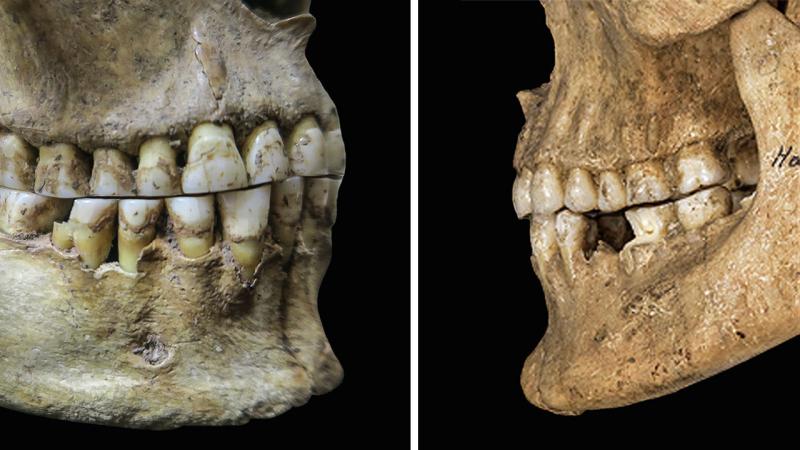Ancient switch to soft food gave us an overbite—and the ability to pronounce 'f's and 'v's | Science | AAAS
Category: Health, Science & Technology
Via: sandy-2021492 • 4 years ago • 11 commentsBy: Ann Gibbons (Science AAAS)



By Ann GibbonsMar. 14, 2019 , 2:00 PM
Don't like the F-word? Blame farmers and soft food. When humans switched to processed foods after the spread of agriculture, they put less wear and tear on their teeth. That changed the growth of their jaws, giving adults the overbites normal in children. Within a few thousand years, those slight overbites made it easy for people in farming cultures to fire off sounds like "f" and "v," opening a world of new words.
The newly favored consonants, known as labiodentals, helped spur the diversification of languages in Europe and Asia at least 4000 years ago; they led to such changes as the replacement of the Proto-Indo-European patr to Old English faeder about 1500 years ago, according to linguist and senior author Balthasar Bickel at the University of Zurich in Switzerland. The paper shows "that a cultural shift can change our biology in such a way that it affects our language," says evolutionary morphologist Noreen Von Cramon-Taubadel of the University at Buffalo, part of the State University of New York system, who was not part of the study.
Postdocs Damian Blasi and Steven Moran in Bickel's lab set out to test an idea proposed by the late American linguist Charles Hockett. He noted in 1985 that the languages of hunter-gatherers lacked labiodentals, and conjectured that their diet was partly responsible: Chewing gritty, fibrous foods puts force on the growing jaw bone and wears down molars. In response, the lower jaw grows larger, and the molars erupt farther and drift forward on the protruding lower jaw, so that the upper and lower teeth align. That edge-to-edge bite makes it harder to push the upper jaw forward to touch the lower lip, which is required to pronounce labiodentals. But other linguists rejected the idea, and Blasi says he, Moran, and their colleagues "expected to prove Hockett wrong."
First, the six researchers used computer modeling to show that with an overbite, producing labiodentals takes 29% less effort than with an edge-to-edge bite. Then, they scrutinized the world's languages and found that hunter-gatherer languages have only about one-fourth as many labiodentals as languages from farming societies. Finally, they looked at the relationships among languages, and found that labiodentals can spread quickly, so that the sounds could go from being rare to common in the 8000 years since the widespread adoption of agriculture and new food processing methods such as grinding grain into flour.
Bickel suggests that as more adults developed overbites, they accidentally began to use "f" and "v" more. In ancient India and Rome, labiodentals may have been a mark of status, signaling a softer diet and wealth, he says. Those consonants also spread through other language groups; today, they appear in 76% of Indo-European languages.
Linguist Nicholas Evans of Australian National University in Canberra finds the study's "multimethod approach to the problem" convincing. Ian Maddieson, an emeritus linguist at the University of New Mexico in Albuquerque, isn't sure researchers tallied the labiodentals correctly but agrees that the study shows external factors like diet can alter the sounds of speech.
The findings also suggest our facility with f-words comes at a cost. As we lost our ancestral edge-to-edge bite, "we got new sounds but maybe it wasn't so great for us," Moran says. "Our lower jaws are shorter, we have impacted wisdom teeth, more crowding—and cavities."
*Correction, 15 March, 11:10 a.m.: This story erroneously stated that the newly favored consonants led to the replacement of the Latin patr to Old English faeder about 1500 years ago. Patr came not from Latin, but from the Proto-Indo-European language that gave rise to Latin and other languages in Europe and Asia.

Tags
Who is online
25 visitors

Very cool article! Thanks for sharing!
Interesting. Thanks.
Neato, I just tried pronouncing F and V without using the overbite, it's hard
PS perfect article coming from you Sandy
I actually have a problem with how this is worded. The upper jaw is immobile. When we speak, we move our lower jaw, lips, and tongue in relation to the upper jaw. A better way to say it would have been that an edge-to-edge bit makes it harder to pull the lower lip back against the upper front teeth, which is how we pronounce labiodentals. It can be done, but it takes more effort.
So, if you raised a 21st century baby on hunter-gather foods, they wouldn’t develop an overbite? Or is it genetic now?
It's more genetic now. That's why wisdom teeth are often impacted and are often considered to be vestigial - our jaws are shorter than our ancestors'. It is theorized that lacking one or more wisdom teeth, which happens on occasion and seems to be increasing in frequency, is an evolutionary adaptation - impacted and crowded teeth may be a reproductive disadvantage.
I always heard that wisdom teeth were needed because by the time they came in, our old molars were worn out. Is that wrong?
It might have been true with our ancestors - they might have been necessary, or at least useful, while they generally aren't, today.
All I have to say is F... that.